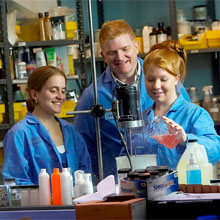After Graduation
Lafayette's mechanical engineering majors are highly sought after graduation, and regularly hired by companies such as ExxonMobil, Air Products, Lutron Electronics, Curtiss-Wright and Foster Wheeler, and AmeriCorps NCCC.
Lafayette’s mechanical engineering majors are highly sought after graduation, and regularly hired by companies such as ExxonMobil, Air Products, Lutron Electronics, Curtiss-Wright and Foster Wheeler, and AmeriCorps NCCC. A number of students looking for more intensive, specialized study are accepted for admission to graduate schools such as Massachusetts Institute of Technology (MIT), Virginia Tech, and Georgia Tech.
Some take their technical knowledge learned at Lafayette and apply to law schools such as Brooklyn Law and University of Miami, and others opt for graduate study in related fields like physics and biomedical engineering.
Lafayette’s Career Services office provides excellent resources for students seeking internships, jobs, service in Teach for America, the PeaceCorps, or other organizations, or guidance in the graduate school application process.
When Mike De Gregorio ’05 wakes up each morning, he is focused on finding ways to improve the sensitivity of a prosthetic hand. He wants to uncover the mechanism that will make the hand respond as if it were integrated with the human body’s signaling system. It’s all part of his graduate studies at Arizona State University, where he’s working toward a Ph.D. in mechanical engineering. It’s particularly challenging because it involves the spinal reflex—that movement that tells you to pull away from a hot stove—and because it means making the prosthetic device behave more like a human hand. “It’s like putting in pre-programmed reflexive responses so the hand knows how to react.”
The long hours he dedicates to his project, collaborating with others, are a natural outgrowth of his experience at Lafayette. “By being in small classes, I got to know and interact with the professors and my fellow students, so it was kind of like being in a lab,” says DeGregorio. “There was a free-flowing sharing of ideas. Things just seemed to click. The process was very conducive to learning and trying new things. It’s similar to my experience with research and graduate work where I am now.”

Christina Mack ’09, working in a lab with other students.
One of the best things about engineering at Lafayette for Christina Mack ’09 was the fact that it focused on what students needed to know—for both inside the lab and outside in the working world. That combination of technical and professional skills has helped her the most as an utilities/offsite refinery contact engineer with ExxonMobil. “Labs provide you the opportunity to develop technical writing skills. Starting out as a young engineer in the workforce, you work closely with other senior engineers, and Lafayette taught me how to interact and ask questions through interactions with the mechanical engineering professors,” she says.
While at Lafayette, Mack took advantage of other opportunities available to her, such as taking an interim study abroad class focused on Italian art and architecture. Mack also opted for a mathematics minor, and considered graduate school, but realized she did not need it in order to maintain the job she was interested in. She’s thinking about going back to school at some point for an M.B.A., “but most of those programs prefer a few years of experience.”
 Brendan O’Dea ’07 uses his Lafayette education “every day.” As a patent attorney for New York State, he assists clients seeking patents on their inventions. O’Dea enrolled in Brooklyn Law School and graduated in 2010.
Brendan O’Dea ’07 uses his Lafayette education “every day.” As a patent attorney for New York State, he assists clients seeking patents on their inventions. O’Dea enrolled in Brooklyn Law School and graduated in 2010.
Lafayette alumni seem to echo each other in the gratitude they feel toward the special nature of the engineering programs, especially the accessibility of the faculty. O’Dea says, “I never felt that I was without a resource on a particular problem or project, and could always approach a professor for guidance.” He says he initially never contemplated law school, but then talked to some faculty and other mentors who had obtained patents and it sparked his interest. “Around the end of my junior year, I had decided that I wanted to pursue a career focused on protecting the kinds of ideas I had been working to master. I am now doing exactly what I set out to do, and love the work I do every day.”